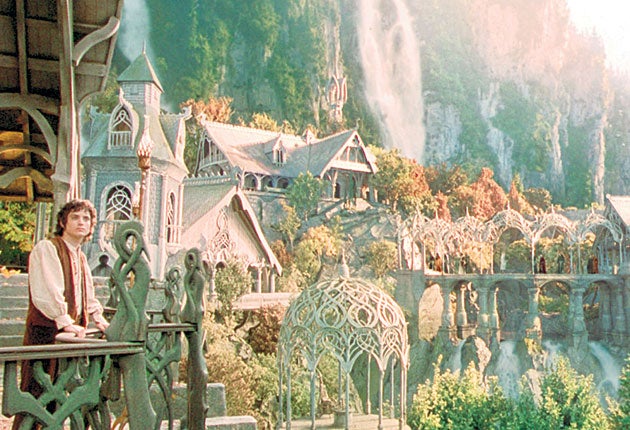There are plenty of reasons to visit New Zealand, but if you were to peruse one of its holiday brochures, might you flick past pictures of stunning scenery and vineyards full of Sauvignon Blanc to gawp at something more mundane? Are you the kind of person who would ignore the country's famous whale-watching and adventure sports, and instead dream of visiting a field once occupied by the actor Martin Freeman, plus some men with pointy ears and hairy feet?
I only ask because John Key, that nation's Prime Minister, reckons you are. He's spending around £100 million of taxpayer money, and has agreed to re-write longstanding laws designed to protect vulnerable low-income workers, in order to prevent supposedly-patriotic film-maker Sir Peter Jackson from following through on a threat to move production of the two forthcoming Hobbit films to an alternative country.
After emergency meetings with some extremely-wealthy Hollywood executives, Mr Key on Wednesday announced the cost of keeping The Hobbit: an extra £25m tax break, plus a pledge to waive trade union and wage law for the film industry, so workers there can be paid less than the minimum wage, for a 14 hour day. This, he claimed, will "safeguard thousands of jobs" and "promote New Zealand on the world stage."
Now, I live in Los Angeles, not a million miles from Bel Air, where Mr Alan Horn, the studio chief of Warner Brothers, occupies a mansion next door to the opulent estate where Sonny Bono and Cher used to live. So trust me when I say that he and his company do not exactly seem to be strapped for cash. Neither are their planned Hobbit films likely to be a financial drain: the three Lord of the Rings made almost £1.25 billion at cinemas alone.
New Zealand nonetheless sees fit to re-write its laws and spend roughly £25 for every man, woman and child in the nation, in order to add some percentage points to Warner's profits. Its citizens apparently approve of this, too: at the weekend, thousands of demonstrators took to the streets of Auckland waving signs with slogans like: "We Love Middle Earth."
But is The Hobbit worth fighting for? No one really knows. Sure, plenty of locals will get some itinerant work on its set. But in terms of long-term jobs, the picture is murky. The country's entire film industry currently employs just 7,000 people; even if it doubles in size, it's hardly going to become financially significant. Will investment flow into New Zealand's wider economy, through tourism and the like, because of the films? I wouldn't count on it. Will they help more big movies get made there in future? Not unless the government keeps ponying-up more cash.
All of which raises a wider question: should major studio films ever be subsidised? On a global level, movies benefit from more public cash than any other art form. Yet unlike many theatres or galleries (which would cease to exist without state subsidy), they are already part of a hugely profitable industry, dominated by global corporations. And if subsidies were removed, these firms would still turn a decent profit.
David Cameron appears to appreciate this point, which may be why he scrapped the Film Council, upsetting quite a few millionaire luvvies in the process. The taxpayers of Michigan also get it, since they just learned that their subsidy programme, which cost $120m in two years, led to an overall decline in film industry jobs. So New Zealand should be careful: Hobbits look similar to leprechauns, and we all know what happens to people who go chasing their pots of gold.
Welcome innovation starts at the bottom
It's been a while since mankind managed significantly to improve the business of wiping one's bottom (the launch of Andrex "quilted" was probably our last great leap forward) so thank goodness for Kimberly Clark, one of the world's biggest makers of bog roll, who claim to have come up with the biggest improvement in defecation technology in over a century: tube-free toilet paper.

Watch Apple TV+ free for 7 days
New subscribers only. £8.99/mo. after free trial. Plan auto-renews until cancelled

Watch Apple TV+ free for 7 days
New subscribers only. £8.99/mo. after free trial. Plan auto-renews until cancelled
This splendid new product allows every last piece of a roll to be used, since there's no brown cardboard in the middle for the final sheet of two-ply to be frustratingly glued to. Its patented design is good news for the environment, too: no card means fewer trees go into a roll, and there's no leftover waste to clog the bathroom bin. Next Monday sees these new items hit US stores.
Within a few years, they deserve to be ubiquitous. Traditionalists may of course mourn the loss of old-fashioned toilet rolls since, as any Blue Peter fan will tell you, cardboard tubes are second only to cereal boxes in usefulness for childhood arts and crafts. But such is progress.
Divided by language, united in prejudice
My son, aged four months, came back from his "mother and baby" class in Los Angeles yesterday with an angry red mark on his arm. Discussing its provenance, my wife made a fascinating discovery: in America, the phrase "Chinese burn" is meaningless; they call it an "Indian burn".
Britain and the US are of course two nations divided by a common language. But here, we are united by prejudice. The two phrases allude to the skin colour of ethnic minorities. A Canadian friend, by contrast, grew up calling the "Chinese burn" a "morsure de serpent" – literally "a snake bite." In this, if nothing else, French speakers are ever so politically correct.
g.adams@independent.co.uk
Subscribe to Independent Premium to bookmark this article
Want to bookmark your favourite articles and stories to read or reference later? Start your Independent Premium subscription today.


Join our commenting forum
Join thought-provoking conversations, follow other Independent readers and see their replies